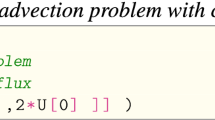
Overview
- Definitive and authoritative guide to FEniCS programming
- Revised, expanded and improved version of the very popular FEniCS Tutorial chapter that many users have enjoyed for the last 5 years
- Teaches how to program advanced finite element solvers for challenging applications in just minutes, including basic Python programming, finite element methodology and its application to a range of fundamental PDE models
- Comes with a series of example programs that demonstrate fundamental techniques
- Can be used as a starting point for readers who want to implement their own PDE solvers
- Includes supplementary material: sn.pub/extras
Part of the book series: Simula SpringerBriefs on Computing (SBRIEFSC, volume 3)
Buy print copy
Tax calculation will be finalised at checkout
About this book
This book offers a concise and gentle introduction to finite element programming in Python based on the popular FEniCS software library. Using a series of examples, including the Poisson equation, the equations of linear elasticity, the incompressible Navier–Stokes equations, and systems of nonlinear advection–diffusion–reaction equations, it guides readers through the essential steps to quickly solving a PDE in FEniCS, such as how to define a finite variational problem, how to set boundary conditions, how to solve linear and nonlinear systems, and how to visualize solutions and structure finite element Python programs.
This book is open access under a CC BY license.
Similar content being viewed by others
Keywords
Table of contents (5 chapters)
Reviews
Authors and Affiliations
Bibliographic Information
Book Title: Solving PDEs in Python
Book Subtitle: The FEniCS Tutorial I
Authors: Hans Petter Langtangen, Anders Logg
Series Title: Simula SpringerBriefs on Computing
DOI: https://doi.org/10.1007/978-3-319-52462-7
Publisher: Springer Cham
eBook Packages: Mathematics and Statistics, Mathematics and Statistics (R0)
Copyright Information: The Editor(s) (if applicable) and The Author(s) 2016
Softcover ISBN: 978-3-319-52461-0Published: 29 March 2017
eBook ISBN: 978-3-319-52462-7Published: 21 March 2017
Series ISSN: 2512-1677
Series E-ISSN: 2512-1685
Edition Number: 1
Number of Pages: XI, 146
Number of Illustrations: 1 b/w illustrations, 16 illustrations in colour
Topics: Computational Science and Engineering, Algorithms, Visualization, Mathematical Software, Numerical Analysis, Software Engineering/Programming and Operating Systems



